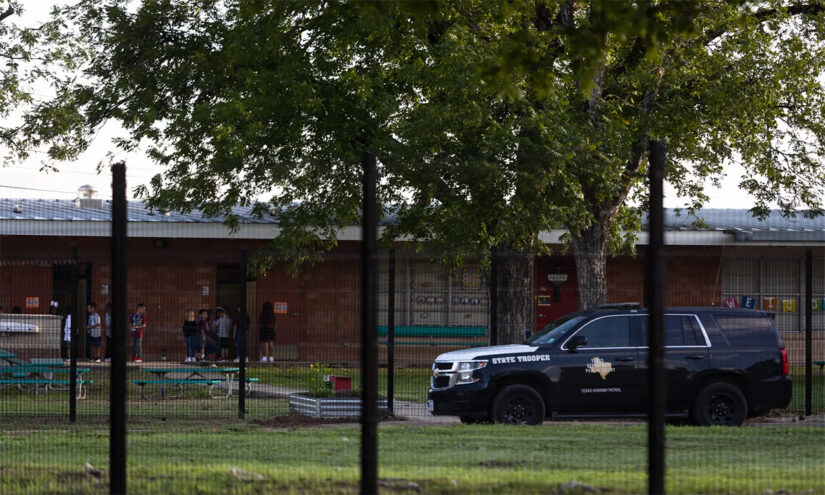During this summer, a team of students from MIT embarked on a journey to the sou …
Lawsuit Filed by Families of Uvalde Shooting Victims Against Texas DPS Officers
Carlos Changemaker

The Texas Department of Public Safety officers who waited 77 minutes to confront the gunman at Uvalde’s Robb Elementary, where 17 children were killed and two were injured in Texas’ deadliest school shooting, are facing a lawsuit filed by the relatives of the victims. The legal action was announced last week by the lawyers representing the families.
Veronica Luevanos, the mother of Jailah and the aunt of Jayce, two of the deceased children, expressed frustration, saying, “Nearly 100 officers from the Texas Department of Public Safety have yet to face a shred of accountability for cowering in fear while my daughter and nephew bled to death in their classroom.”
Just before the two-year anniversary of the tragic incident, legal action was taken against 92 DPS officers linked to the shooting, where an 18-year-old used an AR-15 to fatally shoot 19 students and two teachers in adjoining fourth-grade classrooms.
Relatives of the majority of the slain students and the two injured children have also decided to sue Mandy Gutierrez, the former principal of Robb Elementary, and Pedro “Pete” Arredondo, the former school district police chief, for their alleged inaction on that fateful day.
Last week’s announcement also revealed that the city of Uvalde will be paying $2 million to the families to avoid a legal battle. The city has also committed to providing additional training for present and future police officers, designating May 24 as an annual day of remembrance, and collaborating with the victims’ families on creating a permanent memorial at the city plaza, among other initiatives.
Regarding the lawsuits and settlements, a spokesperson for the Texas Department of Public Safety declined to comment, citing the ongoing legal proceedings.
An attorney for the families, Josh Koskoff, voiced concerns during a press conference in Uvalde, pointing out that the state’s lack of adequate resources for training law enforcement in small communities like Uvalde played a role in the tragic incident. He emphasized the need for better support and training to prevent such occurrences.
Highlighting the challenges faced by smaller communities in terms of resources and training for law enforcement, Koskoff questioned the state’s stance, asking, “You think the city of Uvalde has enough money, or training, or resources? You think they can hire the best of the best?”
The families of the victims are evidently seeking accountability not only from local officials but also from state and federal entities. Javier Cazares, the father of Jacklyn Cazares, one of the victims, emphasized the anguish endured by the families in the two years since the tragic event and called for corrective actions to be taken.
Touching on the legal aspects of the case, the families’ lawsuit may face challenges due to qualified immunity, a judicial doctrine that protects government officials from liability unless a violation of constitutional rights can be proven.
State Senator Roland Gutierrez, who represents Uvalde, has previously introduced legislation to abolish qualified immunity, but the bill, along with others proposed in response to the school shooting, failed to pass in the Legislature.
As part of the settlement with the city of Uvalde, provisions will be made to establish new standards for evaluating the fitness for duty of police officers, with an emphasis on cooperation with the Justice Department for improved training protocols in the future.
Veronica Luevanos expressed relief and a sense of progress in the aftermath of the settlement, calling it a step toward restoring trust in the systems that failed to protect the families impacted by the tragic event.
The city of Uvalde acknowledged the devastating impact of the 2022 shooting on the community and expressed gratitude to the victims’ families for their collaboration in fostering healing and remembrance.
An investigation by a Texas House committee exposed severe shortcomings and flawed decision-making by the numerous law enforcement officers involved in the protracted response to the shooting.
According to the committee’s report, 376 officers descended on the school in an uncoordinated manner, disregarding established active shooter protocols, resulting in confusion and delays.
The House report highlighted the haphazard response of the law enforcement personnel, with a significant number of officers arriving from various agencies, including federal and state, without a clear command structure or effective communication channels in place.
Despite undergoing some form of active shooter training in their law enforcement careers, the majority of the responders on-site did not have adequate recurring training on dealing with such crises. Following the incident, Texas mandated that officers receive more frequent and comprehensive active shooter training.
In the aftermath of the tragedy, a considerable number of law enforcement officers who were involved either resigned or were terminated, including Pedro “Pete” Arredondo, the former school district police chief.
The interaction between law enforcement and the shooter was also scrutinized, as officers failed to engage the assailant promptly, disregarding the urgency indicated by the ongoing threat inside the classrooms.
The release of records related to the DPS investigation into the shooting is currently being contested by the agency. Questions have been raised about the narrative shaping by DPS officials to diminish local law enforcement’s perceived incompetence.
Josh Koskoff, the attorney representing the families, criticized the DPS for attempting to shift blame onto local law enforcement and emphasized the need for accountability and transparency in the aftermath of such tragic events.
Pooja Salhotra contributed to this story.


